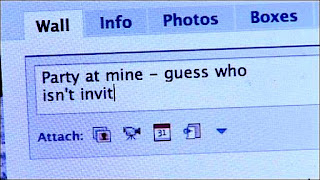It’s windy today, with gusts up to gale force predicted. This
is the sort of weather when primary teachers will solemnly say in the staff
room, ‘the children are going to be awful today’. I remember that when I was
training to be a teacher, one of the trainees said in a behaviour management seminar
that behaviour was worse when windy, and other trainees nodded in agreement as
if it were a well-known, established fact that the more the anemometer spins the
faster children leap from table to table. The tutor raised his eyebrows, and prevented
the discussion going further by suggesting that it was probably the teachers’
expectations that led to children misbehaving.
It’s not just a British theory. This is from a Montessori school blog in the USA:
Beth commented to me about how chaotic the classroom seemed one morning. With one look outside I turned to her and said, “Windy day outside”. I explained to her I can tell the type of day we’ll have at school based on the wind. She was impressed and agreed with me, she never made that connection.
At the first couple of schools where I worked, the view that
windy weather causes misbehaviour was often expressed. However, I then worked at a school where no one mentioned it at all, so there were no expectations communicated to the children. One very windy day I decided to
make an informal investigation, based unscientifically on my own observations.
I was on duty at playtime, and there were no more negative incidents than
normal. I went past other people’s classrooms, and there was no more noise than
normal. My own class seemed no different even though the view from the window
showed horses and sheep trembling while vegetation sped past.
While there is some scientific evidence (such as this 1999 study) that all humans (not just children) can
be slightly affected by changes in the weather (not just wind), it is broadly an
old wives’ tale. Teachers who think that the children are going to play up may unconsciously
cause this by their own expectations which they communicate to the children (“just
because it’s windy outside I don’t want anyone to use this as an excuse for being
naughty”), or perhaps they are more alert to misbehaviour because of their
assumptions. Or they have had a rotten journey to school in the bad weather and
are more touchy than usual.
The only element of truth I can discern is this: where there is an
increase in the noise of pupils talking in a classroom, there are certain children
who cannot stop themselves from either humming, singing or rhythmically
tapping. Perhaps when the white noise increases outside, there is an increase
in classroom noise generally. But that is the limit of it.
What is the origin of this notion? Perhaps it has its roots
in the nineteenth-century origin of universal primary education, at a time when
people were more familiar with the daily sight of animals. Anyone who has a cat
will know how agitated they become when there is windy weather, and dogs
respond to drops in the barometer. The same with farm animals. Maybe this is
because the wind confuses their senses: local smells vanish, the white noise of
rushing wind dominates the sound. Teachers often humorously compare children to
animals: does the theory of poor children’s behaviour contain the vestige of a nineteenth
century teachers’ joke? The horses are neighing, the cats are bristling, the dog
is running wildly down the street and the children are going to be a nightmare today.


